The following recap contains spoilers for Lucky Hank S1E5, “The Clock” (written by Jean Kyoung Frazier and directed by Jude Weng)
Not since Michael Scott snipped and snapped his way through a three-hour braise of the osso bucco has a dinner party among colleagues been as cringy and difficult to watch as the one the Railton College English department gathered for this week on Lucky Hank. Only Hank Devereaux can turn a seemingly mellow occasion into the obscenely melodramatic in such an over-the-top way as we saw in Episode 5, “The Clock.”
The annual dinner party hosted by Hank and Lily Devereaux is the backdrop for some of the funniest, cringiest, and most expositional material we have seen all season, and this type of setting (where Hank is able to match wits with and spew his grumpiness towards every guest in his home) is the ideal vehicle for a show like Lucky Hank. Driven by Bob Odenkirk and Mireille Enos’ sublime performances, they help raise the level of the entire supporting cast, who are all given their moments to really cook in this one.
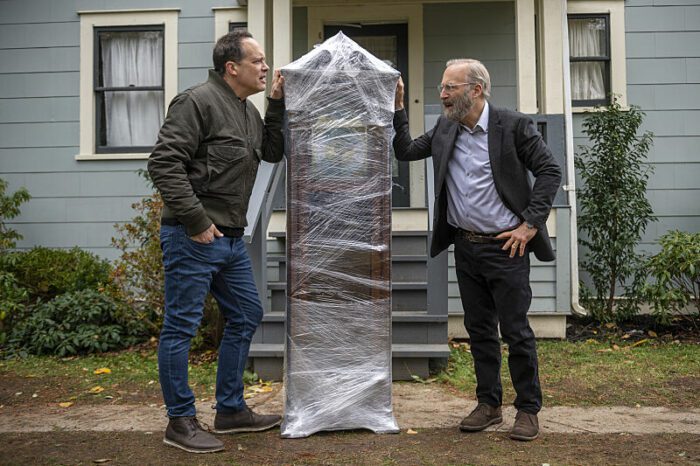
Throughout the course of the first four episodes, we have seen Hank as a young boy spending much time in his father’s office. More specifically, we have seen him playing around and tinkering with an old grandfather clock. Sometimes, it’s a toy to young Hank. Sometimes, it is a mechanical mystery box to take apart. But more often than not, it’s a sound machine where Hank can put his head inside so he doesn’t have to hear his parents’ arguments anymore.
When Hank discovers the old clock in his father’s storage bin (now in its third episode taking up space in Hank’s driveway), he decides among all the possessions in that box, the clock is the one he is going to keep. A theme that has been building across the first four episodes of the season finally codifies around this old clock. Hank’s misery stems from the moment his father left their family, and he has suffered from abandonment ever since.
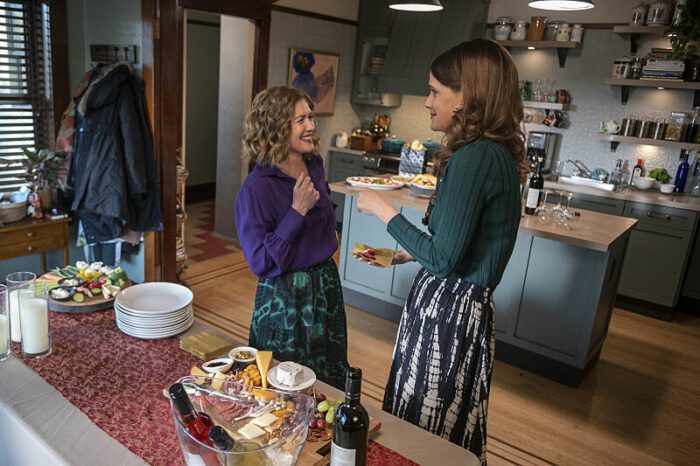
He feels it more sharply when he learned in Episode 3 that his mother—supposedly his closest ally—has been communicating with his father for years, and now the two are not speaking. He feels it when President Pope asks him to make a list of the faculty to cut in Episode 4. He doesn’t want to abandon them. As much as he may despise working with them, he relates to them and their many flaws.
This clock and what it represents has become the anchor that weighs Hank down and ties him to the town of Railton. His abandonment (and his connection to this clock) doesn’t allow him to grow, succeed, or even attempt to accomplish anything because of the possibility that he could abandon someone in the process or he might be abandoned again. We don’t have to dig too deep to find the metaphor when Hank can’t lift the clock on his own to bring it into his house. He asks several members of the dinner party to help him carry it, and it’s clear that even with help it’s a near-impossible burden to carry on one’s own.
Hank and his best buddy Tony finally get the clock inside the house just before the food and drinks are served. The instrument that plays the music of Hank’s personality is now literally in the room for all that is to come next over dinner. But before the main course of conflict, we get several delightful amuse bouches of English department faculty and their personality traits.
Gracie DuBois (Suzanne Cryer) finds out she is going to have a poem published in The Atlantic while at the party, which immediately becomes the highlight of her career. She proceeds to shove her phone and the acceptance email literally into the face of each and every dinner guest, but I for one wouldn’t blame her colleagues if they thought she was being disingenuous.
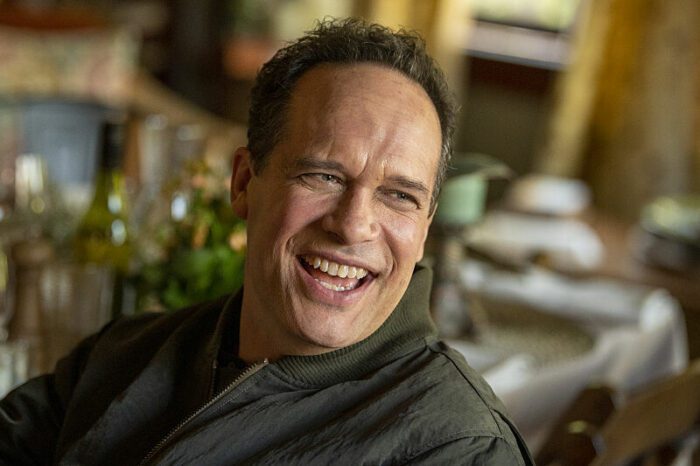
Tony (Diedrich Bader) learns that Teddy and June Washington-Chen have an “open” marriage and he spends most of the dinner trying to decipher the etiquette of how to hit on June without simultaneously offending Teddy. Finny (Haig Sutherland) and Emma (Shannon DeVido) argue over the moral dilemmas presented by the themes in Pinocchio. Paul (Cedric Yarbrough) follows Hank around all night asking if Hank and Lily will sell him the house because it is not a house that someone like Hank deserves.
Despite these shenanigans, Hank and Lily actually invite their guests to get their food and gather around the dinner table. But shortly before eating, Lily receives a call from Tom (the old flame from Episode 4 who tried to reignite things while Lily was at her interview in New York City) telling her that she got the job at the Arlyle School. Hank catches wind of this and is at first relieved because it will give Lily “all the leverage in the world” with her current job and they will write her a blank check to stay.
After all, Hank told Tony earlier, this was just a fantasy of Lily’s. But as Hank sees it as a fantasy, as in the opposite of reality, Lily sees her fantasy as her aspiration. Something she has achieved that she wanted for so long. Most normal people would wait and have this foundational discussion about their future after their guests leave, but Hank is not most people. Lily reminds him that he is only “20% happy” while most other people are more than 50% as he begins to take their dinner guests on the emotional journey with them.
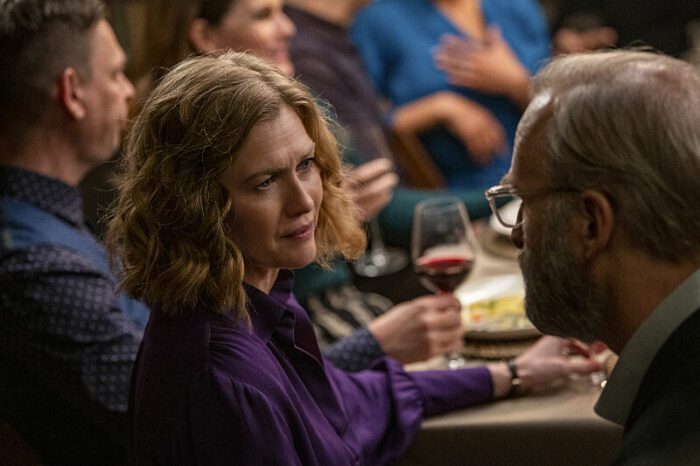
What follows is Hank somehow devolving into unheard-of levels of awkwardness and immaturity. When his colleagues encourage Lily to take the job, which would leave Hank to “go to one of those stupid coffee shops and become one of those cliché” writers, Hank digs in his heels and says he is staying in Railton, even if Lily decides to go.
As the dinner guests grind their pepper and pick at their dinner rolls, Hank and Lily stare holes into each other until Hank confronts Lily about old boyfriend Tom at the table, and it’s not just the stew they are eating that begins to boil over at that point. Lily demands to know why Hank would not come with her, and won’t let him out with the easy answer of, “my life is here!”
The hand on the clock reaches the hour at that moment, causing it to chime, but at the same time, opening all the old wounds in Hank allowing his vulnerability to finally spill out. Lily wants to take the job in New York, he believes, because she is just like his father who took a job in New York and never spoke to him again. He wanted to leave Hank so Lily must want to as well. He is afraid of being abandoned again, and he is sure that’s what Lily wants to do.
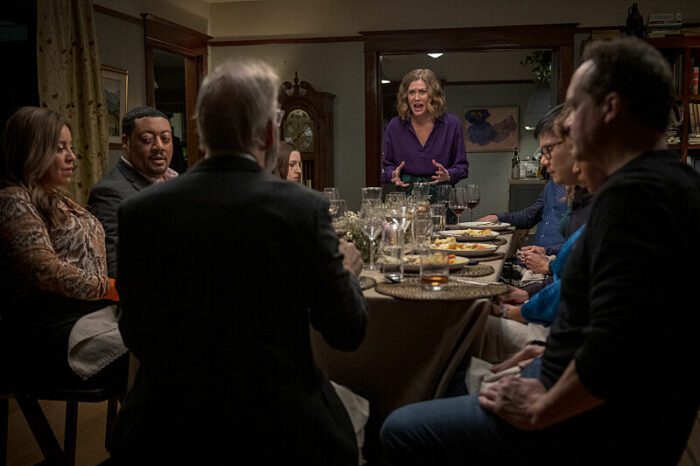
Last week I wondered what spectacular way Hank would find to lose the respect of his colleagues he gained by offering to box a goose on their behalf. Has that happened? When the episode ends we are left with a number of questions. Do the faculty respect Hank for his vulnerability or despise him even more for what he put Lily through? Can Lily and Hank reconcile and what do they decide to do about the job? Would Hank ever consider leaving Railton?
Next week’s episode is titled “The Arrival,” which can only mean one thing: Hank’s father returning to Railton. Does Hank abandon a new life with Lily to try to cling to the shreds of hope he might reconcile with his father? All of a sudden, this show has a number of paths it can take, but do any of them actually lead to hope or optimism for Hank? The arrival of William Devereaux, Sr. next week will begin to lay the bricks on whatever path Hank decides to take.

